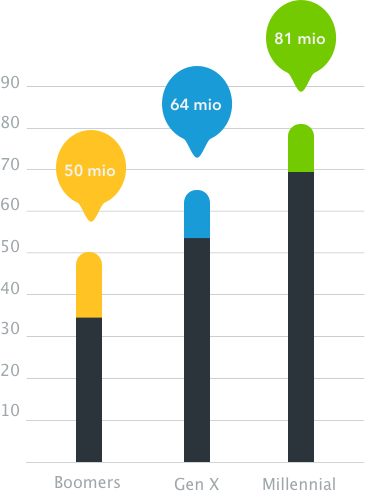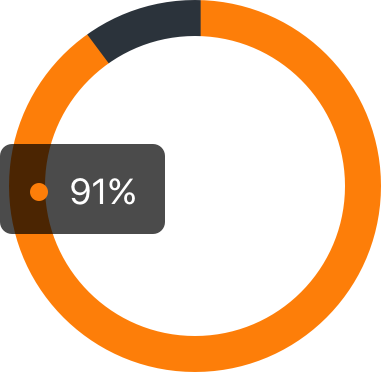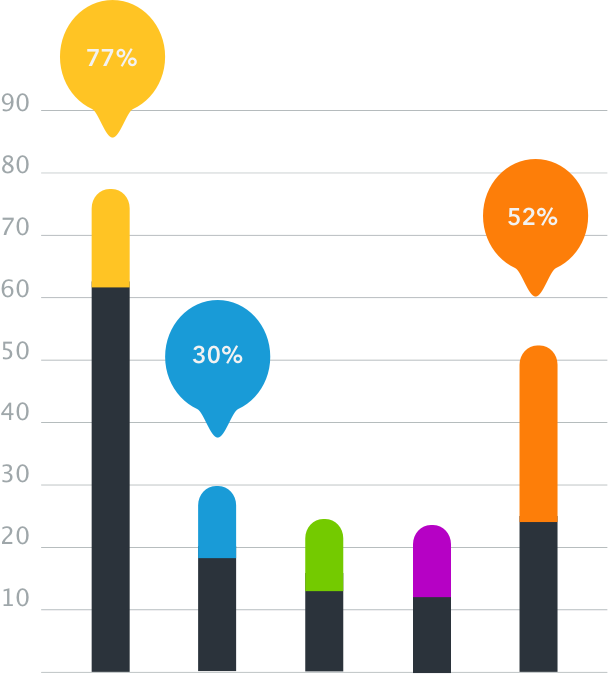
Article
5 min read
The Ultimate Guide to Millennials for the Hospitality Industry
Dom Hopkinson
Jul 21, 2017
Chapters
The ultimate guide to Millennials for the hospitality industry
Sometime around 1991, the word “Millennial” as it defines a generation came into usage. The word talks about anyone born after 1980, which can be summed as the population of young adults.
Another important part of the definition of a Millennial is that they were growing up right along with digital technology and mass media. You’ve probably heard of all kinds of stereotypes associated with Millennials, but are you ready for a shocker? Millennials don’t want to be attached to their screens 24/7, they don’t need ping-pong tables at work, and they’re settling down and having kids at about the same rate as previous generations.
Let’s start by looking at some modern data about Millennials. According to Pew Research, the Millennial population in the United States in 2015 was over 80 million, which outnumbers both Baby Boomers and Generation X. The Baby Boomer generation was larger in its prime, but now that the years have set in and as the cycle goes, the young adult population is the largest. Millennials are also the most diverse generation — according to the U.S. Census Bureau, over 44 percent of Millennials belong to a minority group. Today’s young adults do differ from youth of other generations. For one, they seek inspiration in work, and are willing to strive hard to find that inspiration. Entrepreneurship is a defining motif of Millennials, as one in four is self-employed. Don’t take that to mean Millennials aren’t big earners or achievers with motivations and dreams; Millennials are by far the most successful high school graduates and bachelor degree earners in two decades, despite the rising cost of college tuitions, and that education will eventually pay off in the millions. Some of the stereotypes about Millennials is grounded in real data. For example, Millennials want mentorship and a strong connection with managers and leaders. That desire to have a non-traditional working relationship and a guiding hand in the workplace can seem to Baby Boomers and those of Generation X as a need for coddling or a cry for approval. But the shared sentiment across the generation is that of collaboration, optimism, trust, and purpose.
What do Millennials want?
To paint a clearer picture of today’s millennials, we’ve created three imaginary personas. These fictional personas showcase the diversity of this generation, and highlight the varying motives of people in this age group.
Recent college graduate and high achiever.
The youngest of our study group is Emily, a single 23 year old who lives by herself. Emily just graduated with honors from her local state college with a BA in Administration. She has always been focused and driven, and now she is on the lookout for a perfect opportunity she can capitalize on. Her main desire from an employer is transparency. Emily said about managers, “I prefer managers who allow employees to be autonomous and manage their work with minimal oversight. Trust, ultimately, is a key element between management and their employees for me to feel comfortable. Also, collaboration is essential because people bring unique perspectives to the table. That’s why I think it’s still important to maintain that independence and individuality within a team environment.” Emily makes a strong case for collaboration with individuals who are encouraged by trusting managers. A Millennial like her could bring a lot of energy to a team, as well as encourage teamwork and professional growth.
Young professional with new responsibilities.
Twenty-seven year old Mason is the only male in our study group. He has been married for two years, and has been coasting through life, enjoying his marriage and his job without much thought to growth. Now, though, he is actively seeking a company with a policy of growth because of his wife’s pregnancy. Congratulations, Mason! Mason said, “The key to my professional growth, I think, is regular one-on-one check-ins with a direct supervisor. A supervisor who is also a mentor allows structure for reflection and accountability on the job. Knowing each week that I’ll be checking in with a supervisor allows me to keep track of my short term goals and continue to relate them to the bigger picture. It also sets up opportunities to feel proud of accomplishments.” The example of Mason shows us that older Millennials are settling down just like the generations before them. Mason cares about personal and professional growth. He is thinking about the future of his family, and the future of his company. At the same time, he is actively seeking engagement and cooperation in the workplace between himself and his supervisors.
On-the-go mother seeking control over career.
Our oldest Millennial in the study group is Natalia, who just turned 30. Natalia is a single mother of twin boys. She has a lot of support from her parents, but she still highly values parental leave for those moments when only mother will do. Flexibility is another consideration in Natalia’s decisions, as she needs to be able to make her own hours at times, especially with the summer fast approaching. Natalia is in control over her life, and she wants control over her career, as well. Natalia recently said, “As a mother, flexibility is insanely important to me. I don’t really care what the hours are called — vacation, sick time, whatever — as long as I can get my work done and won’t feel guilty about ducking out if my son all of a sudden has to go to the pediatrician.” The flexibility that Natalia seeks wouldn’t hinder her ability to be productive. In fact, it seems like she is an “always on the go” type of person who prefers the ability to work at any time.
Why don’t Millennials want ping pong tables at work?
You may have noticed that none of our examples included Millennials who wanted ping-pong tables and beer-friendly Fridays. Even the open office layout isn’t there. The omission of those stereotyped benefits is no mistake — Millennials care about real benefits. Let’s look at examples of this with our Millennial characters, Natalia, Mason, and Emily. Natalia wanted benefits like the ability to set her own schedule, which is typical of the generation. They care about freedom, and flexibility with work hours is a major perk to many Millennials. Emily, the youngest of the group, has said,
“Having free time to refresh and refocus is more important than just having a lot of money. Also, a person needs time to do more than work. If I’m not happy, the money doesn’t matter at all.”
That sentiment might sound like all Emily wants to do is have fun and chase dreams. While there is a certain element of a dreamer in a lot of Millennials, Emily is very focused and driven. She is a high achiever who sets goals. Mason is a sports lover, but he doesn’t like to mix business and pleasure. A foosball table at work would be a distraction to him. He would rather have benefits like quarterly bonuses, parental leave, and clear signs of upward mobility. At the end of the day, Millennials are a lot like every other young generation before them. Certainly, they do things in different ways and have different motivations, but they are still like the rest of us at their core. They desire real, concrete benefits; they seek upward mobility and control over their careers; they want to work hard, and be able to work whenever they want. Understanding Millennials can help you attract them, retain them, and engage them as clients and customers.
Recruiting Millennials.
Don’t throw in the towel on recruiting Millennials. They aren’t so different from yesteryear’s youth in what they seek in employment. Here are a few considerations on how you are reaching out to them, and how you plan on treating them in the workplace.
Keep a good online presence.
You probably know that an online presence is necessary in today’s world, especially for a business. Being visible to online searchers can improve sales and reputation. It can also help you attract the Millennial crowd that you’ve been hoping to employ. Alright, you say, but how can a hospitality manager improve an online presence? Start by improving your online content. You should have a website, and the copy there should be written for searchability and relevance. For example, a cocktail bar located in Connecticut, where professional bartenders make craft cocktails for the guests, could be found with a search phrase like “craft cocktail bar in Connecticut” or something similar. The copy, then, should include that exact phrase within the copy. This will rank it higher through Google PageRank, and help make it more visible by being on the first page results. Any images should have alt tags fully written with searchable and relevant text, each page should have metadata that is explicit, and there should be fresh content to keep the site current and well-indexed by search engines. There’s an entire field dedicated to Search Engine Optimization (SEO), and you can delve deep if you want to, although it’s probably enough to have a current website with a peppering of SEO best practices.
Get on social media.
A strong online presence is a good first step when recruiting Millennials. Next, reach out to them where they spend their time online. Get on social media sites like Twitter and Facebook and
LinkedIn, make profiles and use profile pictures with real people’s faces. Just like with your website, your content on social media needs to be relevant in order to attract the Millennial crowd you’re targeting. Don’t use gimmicks and advertising-style campaigns — Millennials will simply tune them out. Instead, use real life stories that inspire and educate. Let’s go back to that bar in Connecticut; they serve craft cocktails made by professional bartenders. They could post a video of a Millennial bartender instructing how to properly flame an orange peel, or how long to shake a Ramos Gin Fizz (it’s far too long). They could post pictures of Millennials that frequent the bar having a good time there. Lastly, encourage your customers to review you on social media. The follows, likes, and comments that build from your requests will secure more interest. Your whole presence will burgeon, and if the content is relevant to Millennials, you’ll attract Millennials.
Be transparent.
Because of the era Millennials grew up in, they are sensitive to the morals of institutions. The Enron scandal in 2001, the bank bailout in 2008, and several other corporate scandals built in them a mistrust of big money and corporations. Now, as the largest workforce in the nation, they seek transparency and morality in their employers. The high standards sought by Millennials means a code of ethics and a dedication to fairness. They want honest companies — honesty about business practices, accurate online representations, and open lines of communication from the top.
Share a sense of purpose.
In broad terms, Millennials want to feel a sense of purpose in their work. A clearly defined mission can serve its purpose as a motivational and organizational tool. During stressful or frustrating times, a shared mission can help refocus the Millennial so that they can push through.
The bigger point doesn’t have to be “making the world a better place” or some variation on that Silicon Valley cliché, but it should be something that can motivate people. Take the time to share your company’s mission with prospective Millennial employees. Your genuine excitement can be infectious.
Good pay, good benefits.
Like anyone else, Millennials look for jobs that can pay them what they need. After all, idealism doesn’t pay the bills and feed children. Older Millennials know exactly that, and since they are the generation who shoulder an average of $37,000 in student loan debt per person, they look for jobs that pay well. Benefits are also important to Millennial workers. That’s not to say roll out the foosball tables and beer-friendly work spaces — no, they want benefits that everyone would want. Things like paid time off, flexible work hours, parental leave, and insurance are on the minds of Millennials today.
Train, manage, and retain.
You’ve recruited several new employees, and now they must be trained and integrated into the new work environment. Standards must be discussed, introductions must be made, and they must be retained for the hire to be successful. This process may sound like a grueling undertaking, but it doesn’t have to turn out to be so. Millennials are people just like you and all of your other employees, and their unique motivations and desires are founded on real events and trends. These insights can make training, managing, and retaining Millennial employees feel easy.
How to train Millennial employees.
Training your Millennial employees might seem like a hurdle, so we’ve put together this list of tips for you:
- Be transparent with information. This means telling the “why” and not just the “how” when teaching new techniques or procedures. Trust that your Millennial employees want to learn, and they’ll trust you enough to be engaged.
- Use shorter content. A study commissioned by Lloyds TSB Insurance found that the average young person’s attention span is only five minutes. If you have videos, keep them under three minutes. If you have written instructions, streamline them for the most direct explanations.
- Go social, go mobile. Use modern technology like social media and YouTube to post videos and start discussions. This will engage more of the Millennial crowd that traditional group training sessions and classroom-style movie watching.
Tactics for managing Millennials.
Tactic #1
Advertising was prominent in the lives of Millennials when they were growing up, and so they have developed a desire for authenticity and honesty. This carries over into the workplace, and in the ideal of a good manager. Related to the ill effects of advertising during their early years, Millennials also look for high levels of transparency. This might be something new to Baby Boomer managers, and the workplace can suffer from the difference in what is expected and what is delivered. One way to incorporate this tactic is by having a very clear employee handbook.
Tactic #2
A manager should work towards open decision making and should make their processes accessible to their employees. Another move towards transparency is using social collaboration and planning tools to share processes, such as procedures during a power outage or an incidental short staffing. The insight into the functions and inner workings of their workplace will create trust between the Millennial worker and the manager.
Tactic #3
Traditional work hours are the bane of the Millennial — partially due to a lust for instant gratification and partly due to the instantaneous nature of social media. Almost any question can be answered by speaking it into your phone, and Millennials grew up in this kind of era. They expect flexible work hours so that they can communicate with co-workers at any time, just like they do everyone else.
Tactic #4
A viewpoint that is shared by most Millennials is the need for a sense of purpose in work. They want to feel like they are part of something greater, working towards a greater good and a larger goal. This struggle for satisfaction goes so far that Millennial workers are just as focused on people and purpose as they are profit.
Tactic #5
To capitalize on these shared attributes, try scheduling groups together consistently to build the camaraderie that Millennials look for. They will create bonds together and solve problems together that may work out better than you could have hoped for. Also, hold meetings about service and business goals that include the staff; meetings about takeaway, business direction and goals, and customer expectations will help Millennials get that sense of purpose they crave.
Millennial employee retention is valuable.
The hospitality industry has one of the highest turnover rates of any job. Consider the damage done by turnover, and you’ll see why it’s important to focus on employee retention. First, the guests are affected by the turnover. Understaffing impedes service, and delays can be common in a situation where every employee is fresh out of training or there aren’t enough employees to cover shifts. Also, the employees themselves suffer from the high turnover — working several long shifts during a week because of understaffing puts undue stress on the tenured employees. Those tenured employees are the ones who solve problems, understand policy and process, and connect with regular guests. They are dedicated, and are willing to put back into the company they admire. The importance of employee retention can’t be understated. But how do you attract the employees that you want to retain? For starters, Millennials want to trust their employer. They want to feel connected to an honest company that doesn’t try to sell them an ideal or an image. Millennials grew up in the age of technology and advertising — they’ve had enough of being marketed to. You can build the trust of your Millennial employees by making good on promises you make. Don’t use gimmicks or fine print or other ploys. A commonplace occurrence is a gym offering limited deals that can change on a whim. This kind of arbitrary rule making and breaking won’t attract Millennials, and those that stray will be sure to let the gym know how they feel on social media and online review sites. Other Millennials will view that gym as untrustworthy, which could hurt future hiring processes and employee retention. Don’t underestimate the importance of mentorship, either. Millennial employees place high value on the relationship they have with their immediate supervisor, as well as the senior management. They want to feel respected by management, and to share mutual trust.
Hospitality scheduling for Millennials.
Millennials want flexible schedules and the option to work remotely — but how does this fit into the hospitality industry? Here are some suggestions for meeting both the needs of your business and desires of your workers through flexible scheduling.
Remote work options for Millennial staff.
It’s been proven that working remotely can increase productivity. Things like meetings that happen unexpectedly, or a spontaneous conversation with a coworker, or even an obnoxious coworker, can be major distractions from work. That time can be better utilized by being alone and comfortable. What’s more, remote work options can actually improve employee retention, which is a major concern in the hospitality industry, as well as with Millennials in general. Consider the options for remote work, and decide what’s right for your company.
91% of remote workers believe they
“get more work done when working remotely”.
Remote work options for hospitality managers and shift leaders.
We know that working remotely can increase productivity. All of those undue distractions that bog down the process of thinking clearly and sitting for prolonged periods can be removed and controlled at home. This is not true for everyone — there should be an open discussion about the risk of distractions when working remotely if you choose to allow remote work at your business.
Remote work options for hourly hospitality employees.
There are tasks that simply cannot be performed from home. Most of these tasks are delegated to hourly employees. So when an hourly employee is seeking remote work options, they are normally met with a wall of blank stares.
Short training videos that can be viewed with a mobile device provide hourly employees with a remote work option. If you’re holding frequent meetings, try moving some of them to the web with online meeting tools. And use Instagram, Facebook, and Twitter to engage not only your Millennial employees but also you Millennial customers. Perhaps you don’t have the budget to provide more in-depth work-from-home options — that’s alright. Communicate that with your Millennial staff, since they seek transparency and mutual trust.
The benefits of flexible schedules.
Flexible schedules and the option to work remotely is an enticing bonus for many Millennials. Many Millennials feel a need for instant gratification, which can be partially sated by working whenever they want, and not working when they don’t want to. If you can be open to the idea of a flexible schedule, where success is measured by the quality of work and completion rather than hours spent on the job, you are likely to attract and retain Millennial employees. In the hospitality industry flexible scheduling and remote work can be a little tricky, though. Hotel rooms can’t be cleaned remotely, laundry can’t be loaded and switched and folded from home, and that Ramos Gin Fizz isn’t going to shake itself while the bartender is sitting on the couch. Employees have to be there to get the job done, and they have to be there for a certain amount of time. Take this as far as you feel comfortable — if you, as the manager or owner, aren’t sure that your employees can get the job done when setting their own schedules or when working remotely, you don’t have to allow it.
The hidden power of Millennials.
Did you know that 90 percent of customers trust peer recommendations, while only 30 percent trust advertisements? Let’s think about that in terms of Millennials: Those millions of Millennials are a force that you can employ beyond putting them on the payroll. A single Millennial with a popular YouTube channel can have millions of subscribers. That audience cannot be ignored, especially when you can easily use that Millennial as a brand advocate to spread the word about your products and services.
How to engage a brand advocate
If you’ve got a brand advocate in mind already but are unsure of how to strengthen the relationship, here are some ideas:
- Give away your productMost of the time, advertising costs more than a single product by itself. Taking out pages in a print publication or even getting an ad on a high traffic blog can be more expensive than offering free test products. A sample is a great way to engage a potential brand advocate, and if they get the product for free they are much more likely to feel positively about it and share it with their audience.
- Snail mail is interestingWhen you open your mailbox and you’ve got a bunch of bills and a bunch of regular advertising junk, you’re not thrilled. What if you got a package with an actual product, or even a small box with details of how to get a product to test? Snail mail can generate intrigue that email can’t, and people like to get mail other than bills. It’s also much more powerful than a tweet or a like on social media.
- Email still works sometimesThat’s not to say blast a huge group of people with spam emails. The power can be in personalization. If there’s a potential brand advocate that has been following your brand on social media, commenting and liking posts, you can engage that person even further. Send them a personalized email thanking them for the support. The relationship built from that personal message is stronger than spam or advertising.
- Offer discounts or coupons to potential advocatesIf giving away free product is outside your feasible budget, consider discounts. Maybe you have the budget, but you’re not sure that the potential brand advocate has a large enough audience to merit much time. In these cases, a discount can build the relationship you are looking for, and can generate the interest in your brand that turns an intrigued party into a brand advocate.
- Meet them in personIf you really want to build a lasting relationship with you brand advocates, get to know them. If you’ve got a location near them, set up a meeting over coffee or tea. Record a part of it, take a picture, and share it on social media. The care you’ve taken builds rapport not only with the advocate, but both your audience and theirs.
Millennials make good brand advocates.
Most Millennials use social media. That alone is enough to employ them as brand advocates, but there’s more to it than that. Millennials tend to think more about their purchases than other generations, and they look at online reviews more, too. Since we know that peer reviews are increasingly important, it’s no wonder that Millennials can be powerful brand advocates. If you’ve got a grasp on the power of Millennials as brand advocates, the next step is to reach out to them. Using email, physical mail, social media, product discounts and giveaways, and in person meetings, you can build a strong relationship with a brand advocate who will drive business to you. Empower your Millennial audience to share, to be engaged, and to advocate for your brand. As you’ve now read, a millennial workforce is, truly, a force. The largest segment of the population is made up of Millennials, meaning you cannot ignore them.
Master each of these steps
From recruiting to ongoing empowerment -- and you’ll see a functioning lifecycle, with millennials working, shopping, and advocating your brand or business.
Identify what they want
Remember, Millennials are recent college graduates who seek to achieve in big ways. They are newlyweds with babies on the way. They are turning 30 and enjoying all of the strife and passion of life. They seek upward mobility and control over their careers.
Recruit them
To attract Millennials you’ll need to maintain a solid online presence using SEO best practices. Millennials hang out online, so go social and go mobile. Be transparent when dealing with Millennials -- they care about honesty and trust. Share with them a sense of purpose and get them involved. Lastly, ditch the ping pong tables and start offering real benefits like parental leave and insurance.
Train and manage them
It can’t be stated enough that Millennials care about transparency. Let them in on the “why” of a policy and you’ll get great results and possibly feedback. Use shorter content like training videos. Make it a point to retain them. Offer remote work options if you can, and allow for flexible schedules. Millennials want to work when they want to -- trust them and they’ll trust you.
Turn them into brand advocates
This goes for more than just the Millennials who work for you. Many of them will advocate for your brand if they have a positive experience with it, which you can provide to them. Utilize their large audiences and enjoy the low cost for high return.
GET AN EMPLOYEE HANDBOOK TEMPLATE FOR YOUR BUSINESS
Having an employee handbook is one of the most efficient ways of onboarding and training your employees










